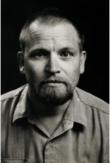Graeme Dixon's mother was a Noongar woman from Katanning and his father was an English migrant orphan who grew up at Fairbridge Farm. He spent several years in Sister Kate's Children's Home, Perth.
Between ten and fourteen, Dixon lived in a Salvation Army Boys Home, before being expelled from high school. Subsequently, he was in and out of reformatories, and at sixteen he was sent to Fremantle Prison where he spent most of the next nine years. His first poetry was written in prison.
At twenty-seven, Graeme Dixon began tertiary study and later completed a course at the Western Australian Institute of Technology (now Curtin University) on politics, communications and Aboriginal Studies.
In 1989, his first collection of poetry, Holocaust Island (1990) won the David Unaipon Award. In 1998 he was part of the Indigenous judging panel for the Marrwarnging Award at the University of Western Australia.
In 2002 Dixon wrote about his life in the publication Echoes of the Past: Sister Kate's Revisited (2002). A selection of his poetry appears in The University of Queensland Press' [UQP] first Black Australian writing anthology, Fresh Cuttings (2003). Also in 2003, he published his second collection, Holocaust Revisited: Killing Time, this time including life stories and essays with his poetry.
Graeme Dixon is the brother of Tjalaminu Mia.
 3256105823586003786.png
3256105823586003786.png

